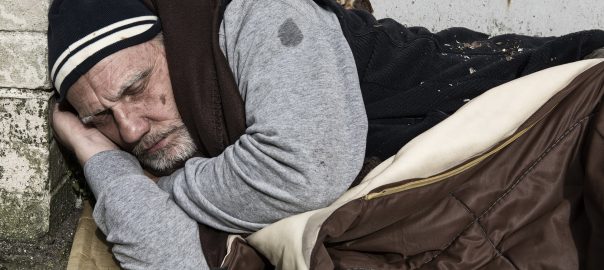On the way to Jerusalem. So begins the narrative of Luke 17:11-19. Neither in Samaria nor Galilee, Christ journeys through a space that is both, but neither. Not quite Jewish territory, nor Samaritan, the place exists somewhere betwixt and between. For Christ had left one land. But hadn’t quite arrived in the other.
It is a borderland of sorts.
It is difficult to define.
It is traveling through another dimension.
A dimension not only of sight and sound but of mind. A journey into a wondrous land whose boundaries are that of imagination. There’s a signpost up ahead. Your next stop, the Twilight Zone.
In this Zone?
Anything is possible.
It is here, in this nebulous, shifting space where Jesus encounters need.
Ten lepers approach him. Not quite in the village, the lepers exist outside the town gates. Outside of a functioning society. Here they lived, cast away from others, isolated from everyone but their own unwell kind.
Called Hanson’s disease, left untreated leprosy can cripple hands, feet, paralyze, cause one to go blind.
Considered contagious in antiquity – we now know better – they might as well have the plague.
Stay away! Because no one wants to be close to that.
It is in this undefined space, beyond borders, separated from the typical trappings of civilization where the lepers make their request.
Jesus have mercy on us!
They need help.
They know it.
They have the audacity to ask.
Perhaps they were looking for food, drink, coin. Cast aside like trash, subsiding on the generosity of others is often the only way to survive.
Hearing their request Jesus went deeper than a quick handout. Go, show yourselves to the priests, he told them. The lepers needed multiple kinds of healing.
First physical.
Their skin ailment had to go.
Then societal.
Rejoining the community that cast them out.
The ten lepers went.
The ten lepers were physically healed.
Nine went ahead, readying themselves to reconnect with family and friends.
Only one turned back.
He bowed down and worshipped Christ.
And he was a Samaritan.
With this latest Twilight Zone entry Jesus crossed the border between one religion and another. For Jews and Samaritans, put plainly, do not get along. Crossing one more cultural chasm Christ proclaimed –
get up!
be on your way!
your faith has made your well.
With that the Samaritan had been healed –
Physically,
Relationally,
Spiritually.
In that moment the foreigner leper – that’s how scripture describes him – was made fully, completely, 100% whole.
It was a fresh start for them in –
Body,
Community,
Soul.
Study
This week our Tuesday morning Bible study group couldn’t help but focus on all the border crossings Christ made on this journey.
He crossed the borders of –
Country and village,
Race and ethnicity,
Health and isolation,
Religion.
All those border crossings of Christ happen in this one brief text.
All so God’s people, no matter who they are, can be whole.
Reflecting on this, someone in the study, asked this question:
Is there any border Christ wouldn’t cross to heal us?
The room was still.
No one said a word.
The silence in that moment provided the only response we need.
Reflecting on this story, and that question, consider these modern day stories. How might you respond?
Intersection
On the way home you’re driving on the highway. No longer in the office, not yet home, you are in a place somewhere between.
It’s summertime. Temps are mild, skies are blue. You put the window down to soak in some sun. You’re in the best of moods. You take the exit ramp, getting into the left-hand lane. The light turns from green to yellow to red. You slow down to stop. You are the first car at the light.
It’s a busy intersection. You’ll be here at least a minute. Perhaps more.
You then notice a man standing 15 feet away. He wears a red MAGA hat, and a shirt that says, Let’s Go Brandon. The man also holds a sign that reads, Homeless. Need money for food. The worn-out shoes he wears, with holes throughout, tell their own story. The two of you couldn’t be more different.
The man walks toward your car. Your driver’s side window is still down.
Hey, can you spare any money? I’m really hungry.
He has the audacity to ask for help.
In this borderland of a stop light, an intersection, a request, somewhere between the defined spaces of work and home anything is possible.
What to do?
Do you put your window up and awkwardly ignore him until the light turns green? Do you rummage around your car for some cash? Do you tell him where in town he can find shelter and a meal? Do you wonder if he deserves your aid at all?
The man clearly needs healing of some sort. You wonder how Jesus might respond. Your say a quick prayer, asking for guidance from above.
Parking Lot
On the way to church you pull in the parking lot, find a spot, get out, lock the doors. You’ve left the car, but you’re not yet inside either. It is a Twilight Zone of sorts, between space and time. You begin walking to the church entrance, dressed in your Sunday best. You are excited for worship, coffee, catching up with friends. In this moment, there is no place on earth you would rather be.
You then notice a sleeping bag on the floor, near the church door. Next to the bag is a backpack, with multiple patches sewn on. Some say Veteran, Blue Lives Matter, Semper Fi. The man in the sleeping bag begins to stir. It seems he’s been there all night, braving the first frost of the season.
The two of you make eye contact. He doesn’t speak a word.
In this borderland of a parking lot, a church, a visitor, betwixt the knowns of home and sanctuary anything is possible.
What to do?
Do you advert your gaze and enter church? Do you introduce yourself, hoping to learn more? Do you practice hospitality, inviting the man into worship, communion, coffee, cookie, conversation? Or do you just call the police?
He seems to need so much. You’re not quite sure how to begin. You take a breath, say a prayer, and choose how you’ll respond.
Gas Station
While vacationing in San Diego you decide to take a day trip to Tijuana. You’re looking forward to good food, good drink, perusing street booths for trinkets. On the way you get lost. An abandoned gas station appears. You pull over and get out, hoping for help.
No longer at the hotel, not yet arrived at your destination where are you? Wilderness is all around. Is this the US? Is it Mexico? The border could be close. You’re just not sure.
A woman and child appear, seemingly from nowhere. With skin darker than your own they run toward you quickly. The pair reaches you, looking tired and distressed. Trembling with fright the woman explains what is going on.
My husband has been imprisoned, my son kidnapped. They have done nothing wrong. We came to the US, hoping for safety. Extended family lives here. If border agents find us they’ll force us back, she continues. Back home I fear for our lives.
Our family lives ten miles up the road. Will you drive us? They will take us in.
The woman needs help.
She knows it.
She has the audacity to ask.
In this borderland of a gas station, a wilderness, a chance encounter, anything is possible.
Oh you know the law. You’re being asked to break it.
And you know the gospel. And Christ’s call to care.
What to do? You are torn. You find yourself wondering: what would Jesus do?
Close
Every day we journey, encountering each other in random, unpredictable ways. Having departed one place, not quite arrived in another, we find ourselves in spaces betwixt and between. Intersections, parking lots and gas stations are transitional spaces. These are the borderlands of our day.
These are the kind of places Christ journeyed.
They are where he –
met people,
heard their pleas,
healed them in body, mind, soul.
We too are asked to cross borders between us and others defined by –
Race,
Gender,
Orientation,
Politics,
Wealth, or
Where we call home.
Christ healed people across all sorts of differences. He didn’t worry much about it.
May we be like Christ, crossing cultural chasms with reckless abandon.
May we be like Christ, healing and helping, as we go. Amen.









